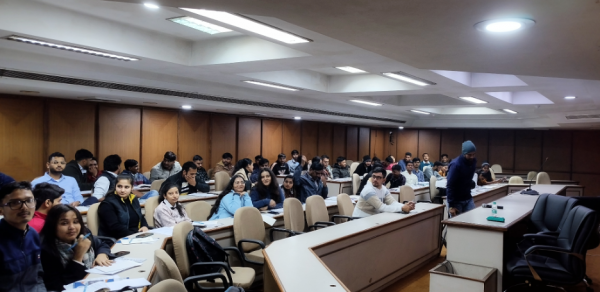
The National Centre for Cooperative Education (NCCE), operating under the auspices of the National Cooperative Union of India (NCUI), recently organised a training and capacity-building program for youth on the "Formation of Cooperative Societies" in a concerted effort to empower and educate the next generation of cooperative leaders from January 29 to February 2, 2024, at the NCUI auditorium in New Delhi.
As part of the course, Mr. Ganesh Gopal who leads Entrepreneurship Development at ICA-AP delivered a session on ‘Youth-Led Innovations in Cooperative Sustainability’ on January 29. He outlined the complexities of cooperative sustainability and delved into various examples, use cases and interventions in cooperative entrepreneurship while recognising the indispensable role of youth in propelling the cooperative movement forward.
The capacity building program with an audience of 65 people, crafted to cater to freshers, students, youth, and cooperative trainers, unfolded an in-depth exploration of essential aspects integral to the establishment and thriving operation of cooperative societies. Encompassing a holistic curriculum, participants delved into topics ranging from the foundational elements of the cooperative business model to the intricate process of Business Model Canvas preparation. Social enterprise dynamics, case studies on campus cooperatives, successful cooperative business models, and an exploration of the key components of cooperative entrepreneurship were also integral components of the comprehensive program.
Mr. Gopal, in his talk, elucidated crucial aspects such as the procedural intricacies of forming a cooperative, a comprehensive exploration of the 7 cooperative principles, a comparative analysis distinguishing a company from a cooperative, and the presentation of exemplary cooperative models. The session underscored the relevance of encouraging youth participation in the cooperative movement, particularly emphasising the resilience of the cooperative model of business during times of crises and uncertainty.
Delving into the institutionalised engagement of ICA-AP with youth, he shed light on ICA-AP committees, with specific mention of the ICA-AP Committee on Youth Cooperation (ICYC) and the ICA-AP Committee on Cooperatives in Educational Institutions (ICEI). Established in 2006, ICYC aims to spearhead initiatives for the development of cooperatives among the youth in the Asia-Pacific region. The committee's objectives include developing youth cooperatives, fostering cooperation among young cooperators, encouraging active youth membership in cooperatives, strengthening youth cooperative business activities, and providing essential linkages and networking opportunities with established cooperatives.
Initiatives launched by ICYC, such as the Go Green Campaign (GCC), were highlighted during the session. GCC, initiated in 2018, sought to mobilise youth from cooperatives for a common cause - environmental protection. Aligned with Sustainable Development Goal 13 (Climate Action), GCC encouraged young cooperators to actively participate in tree-planting initiatives. In 2021, over 17,000 trees were planted across the Asia-Pacific region by 300 members from nine countries, demonstrating the tangible impact of youth-led environmental initiatives. The E-Coop Webinar Series, Cooperative Education, and International Youth Day were also integral components of ICYC's endeavours, showcasing the organisation's commitment to comprehensive youth development.
Noteworthy entrepreneurship development initiatives from ICA-AP, such as the Global Cooperative Entrepreneurs (GCE) program, Youth Replication project, Coopathon series, and Coop-Pitch competitions, were highlighted. Successful youth cooperatives, including the Himalayan Hemp Cooperative, India and the Red Root Artists Cooperative, Philippines, were presented as examples of innovative, youth-driven cooperative ventures.
The GCE, initiated as part of the ICA-European Union project, aimed to empower cooperative entrepreneurs on a global scale through a localised network of mentors and ambassadors. The Youth Replication project, a brainchild of the ICA Youth Network, focused on replicating existing cooperatives and creating new youth cooperatives worldwide funded 9 projects, including two from the Asia-Pacific region.
The Coopathon series and the Coop-Pitch competitions, an integral part of the Asia Pacific Cooperative Youth Summits, sought to promote the involvement of youth and technology to address pressing challenges faced by cooperatives in their daily operations. Mr. Gopal underscored the significance of these initiatives in fostering innovation and collaboration among youth in the cooperative sector. The Coopathon 3.0 and 4.0 winners, Innogame, MyCoon, Muda Mudi Coop, and Coop Youth Planet, demonstrated the potential of youth-led initiatives in sustainable cooperative entrepreneurship. These projects ranged from gaming cooperatives to mushroom cultivation and innovative approaches to the coconut industry, showcasing the diversity and impact of youth-driven cooperative endeavours.
The session not only provided an exploration of the formation of cooperative societies but also served as a platform with relatable examples to underscore the indispensable role of youth-led innovations in ensuring the sustainability, resilience, and continuous evolution of cooperatives globally in the Asia-Pacific region. As the cooperative movement embraces the energy and innovation of the youth, the stage is set for a vibrant and sustainable cooperative future in India and the Asia-Pacific region, which is home to the majority of the world’s youth population. Mr. Gopal stated that such continuous capacity-building programs are a need of the hour to encourage more young people to take up cooperative entrepreneurship and foster a cooperative spirit among the youth, paving the way for a future where cooperative principles are not just learned but lived.
The session was well received by the enthusiastic cohort of participants who brought a kaleidoscope of perspectives to the learning environment, seeking to absorb the nuances of cooperative business models.



